Debating De-registration of Healthcare Professionals
VerifiedAdded on 2021/04/21
|5
|1223
|180
AI Summary
The essay argues that de-registration of healthcare professionals on the basis of professional misconduct might not be the best approach to addressing issues in the failing medical industry. It suggests inspecting the particular misconduct and providing opportunities for defaulters to realize their mistakes and correct them, if necessary.
Contribute Materials
Your contribution can guide someone’s learning journey. Share your
documents today.
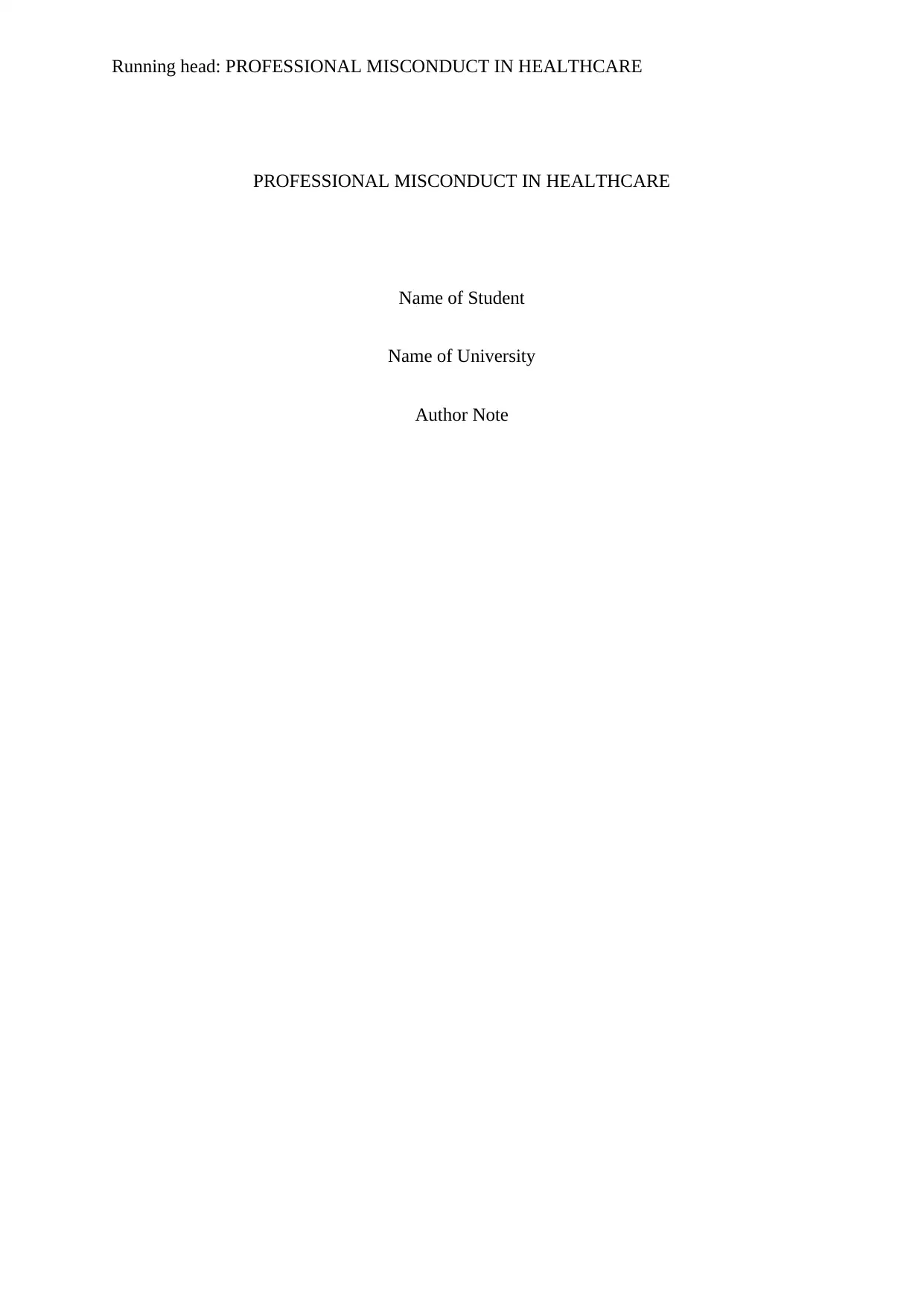
Running head: PROFESSIONAL MISCONDUCT IN HEALTHCARE
PROFESSIONAL MISCONDUCT IN HEALTHCARE
Name of Student
Name of University
Author Note
PROFESSIONAL MISCONDUCT IN HEALTHCARE
Name of Student
Name of University
Author Note
Secure Best Marks with AI Grader
Need help grading? Try our AI Grader for instant feedback on your assignments.
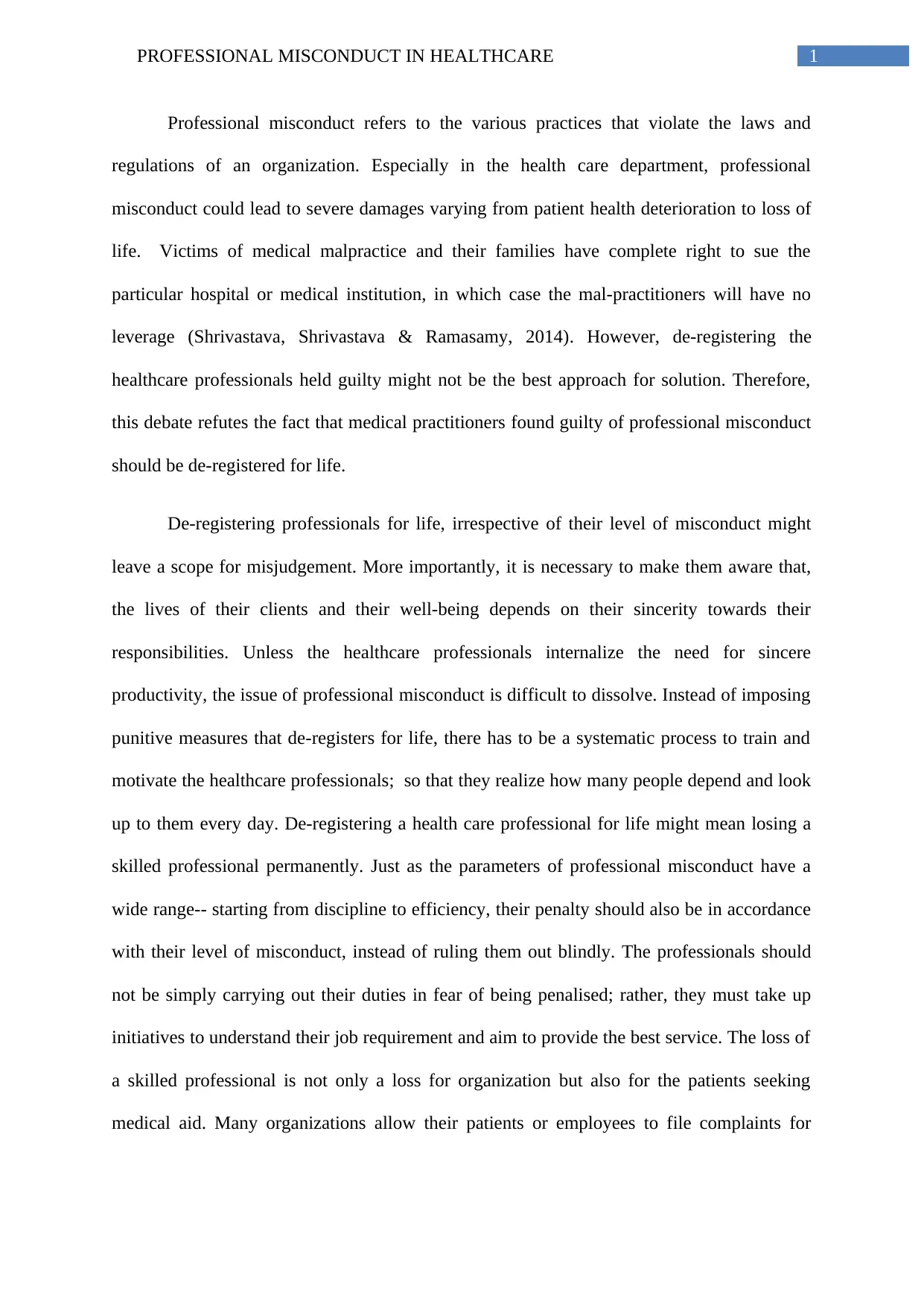
1PROFESSIONAL MISCONDUCT IN HEALTHCARE
Professional misconduct refers to the various practices that violate the laws and
regulations of an organization. Especially in the health care department, professional
misconduct could lead to severe damages varying from patient health deterioration to loss of
life. Victims of medical malpractice and their families have complete right to sue the
particular hospital or medical institution, in which case the mal-practitioners will have no
leverage (Shrivastava, Shrivastava & Ramasamy, 2014). However, de-registering the
healthcare professionals held guilty might not be the best approach for solution. Therefore,
this debate refutes the fact that medical practitioners found guilty of professional misconduct
should be de-registered for life.
De-registering professionals for life, irrespective of their level of misconduct might
leave a scope for misjudgement. More importantly, it is necessary to make them aware that,
the lives of their clients and their well-being depends on their sincerity towards their
responsibilities. Unless the healthcare professionals internalize the need for sincere
productivity, the issue of professional misconduct is difficult to dissolve. Instead of imposing
punitive measures that de-registers for life, there has to be a systematic process to train and
motivate the healthcare professionals; so that they realize how many people depend and look
up to them every day. De-registering a health care professional for life might mean losing a
skilled professional permanently. Just as the parameters of professional misconduct have a
wide range-- starting from discipline to efficiency, their penalty should also be in accordance
with their level of misconduct, instead of ruling them out blindly. The professionals should
not be simply carrying out their duties in fear of being penalised; rather, they must take up
initiatives to understand their job requirement and aim to provide the best service. The loss of
a skilled professional is not only a loss for organization but also for the patients seeking
medical aid. Many organizations allow their patients or employees to file complaints for
Professional misconduct refers to the various practices that violate the laws and
regulations of an organization. Especially in the health care department, professional
misconduct could lead to severe damages varying from patient health deterioration to loss of
life. Victims of medical malpractice and their families have complete right to sue the
particular hospital or medical institution, in which case the mal-practitioners will have no
leverage (Shrivastava, Shrivastava & Ramasamy, 2014). However, de-registering the
healthcare professionals held guilty might not be the best approach for solution. Therefore,
this debate refutes the fact that medical practitioners found guilty of professional misconduct
should be de-registered for life.
De-registering professionals for life, irrespective of their level of misconduct might
leave a scope for misjudgement. More importantly, it is necessary to make them aware that,
the lives of their clients and their well-being depends on their sincerity towards their
responsibilities. Unless the healthcare professionals internalize the need for sincere
productivity, the issue of professional misconduct is difficult to dissolve. Instead of imposing
punitive measures that de-registers for life, there has to be a systematic process to train and
motivate the healthcare professionals; so that they realize how many people depend and look
up to them every day. De-registering a health care professional for life might mean losing a
skilled professional permanently. Just as the parameters of professional misconduct have a
wide range-- starting from discipline to efficiency, their penalty should also be in accordance
with their level of misconduct, instead of ruling them out blindly. The professionals should
not be simply carrying out their duties in fear of being penalised; rather, they must take up
initiatives to understand their job requirement and aim to provide the best service. The loss of
a skilled professional is not only a loss for organization but also for the patients seeking
medical aid. Many organizations allow their patients or employees to file complaints for
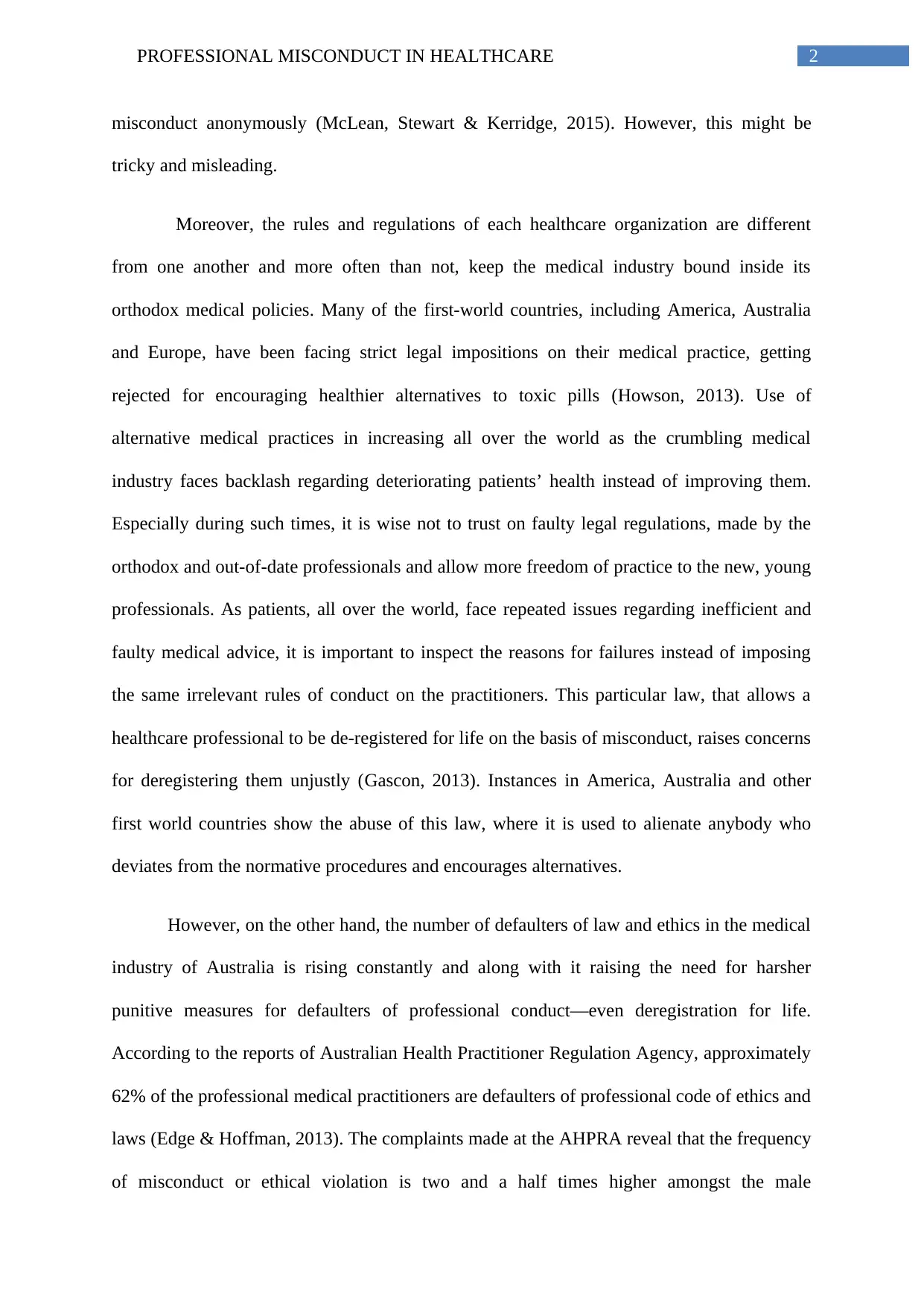
2PROFESSIONAL MISCONDUCT IN HEALTHCARE
misconduct anonymously (McLean, Stewart & Kerridge, 2015). However, this might be
tricky and misleading.
Moreover, the rules and regulations of each healthcare organization are different
from one another and more often than not, keep the medical industry bound inside its
orthodox medical policies. Many of the first-world countries, including America, Australia
and Europe, have been facing strict legal impositions on their medical practice, getting
rejected for encouraging healthier alternatives to toxic pills (Howson, 2013). Use of
alternative medical practices in increasing all over the world as the crumbling medical
industry faces backlash regarding deteriorating patients’ health instead of improving them.
Especially during such times, it is wise not to trust on faulty legal regulations, made by the
orthodox and out-of-date professionals and allow more freedom of practice to the new, young
professionals. As patients, all over the world, face repeated issues regarding inefficient and
faulty medical advice, it is important to inspect the reasons for failures instead of imposing
the same irrelevant rules of conduct on the practitioners. This particular law, that allows a
healthcare professional to be de-registered for life on the basis of misconduct, raises concerns
for deregistering them unjustly (Gascon, 2013). Instances in America, Australia and other
first world countries show the abuse of this law, where it is used to alienate anybody who
deviates from the normative procedures and encourages alternatives.
However, on the other hand, the number of defaulters of law and ethics in the medical
industry of Australia is rising constantly and along with it raising the need for harsher
punitive measures for defaulters of professional conduct—even deregistration for life.
According to the reports of Australian Health Practitioner Regulation Agency, approximately
62% of the professional medical practitioners are defaulters of professional code of ethics and
laws (Edge & Hoffman, 2013). The complaints made at the AHPRA reveal that the frequency
of misconduct or ethical violation is two and a half times higher amongst the male
misconduct anonymously (McLean, Stewart & Kerridge, 2015). However, this might be
tricky and misleading.
Moreover, the rules and regulations of each healthcare organization are different
from one another and more often than not, keep the medical industry bound inside its
orthodox medical policies. Many of the first-world countries, including America, Australia
and Europe, have been facing strict legal impositions on their medical practice, getting
rejected for encouraging healthier alternatives to toxic pills (Howson, 2013). Use of
alternative medical practices in increasing all over the world as the crumbling medical
industry faces backlash regarding deteriorating patients’ health instead of improving them.
Especially during such times, it is wise not to trust on faulty legal regulations, made by the
orthodox and out-of-date professionals and allow more freedom of practice to the new, young
professionals. As patients, all over the world, face repeated issues regarding inefficient and
faulty medical advice, it is important to inspect the reasons for failures instead of imposing
the same irrelevant rules of conduct on the practitioners. This particular law, that allows a
healthcare professional to be de-registered for life on the basis of misconduct, raises concerns
for deregistering them unjustly (Gascon, 2013). Instances in America, Australia and other
first world countries show the abuse of this law, where it is used to alienate anybody who
deviates from the normative procedures and encourages alternatives.
However, on the other hand, the number of defaulters of law and ethics in the medical
industry of Australia is rising constantly and along with it raising the need for harsher
punitive measures for defaulters of professional conduct—even deregistration for life.
According to the reports of Australian Health Practitioner Regulation Agency, approximately
62% of the professional medical practitioners are defaulters of professional code of ethics and
laws (Edge & Hoffman, 2013). The complaints made at the AHPRA reveal that the frequency
of misconduct or ethical violation is two and a half times higher amongst the male
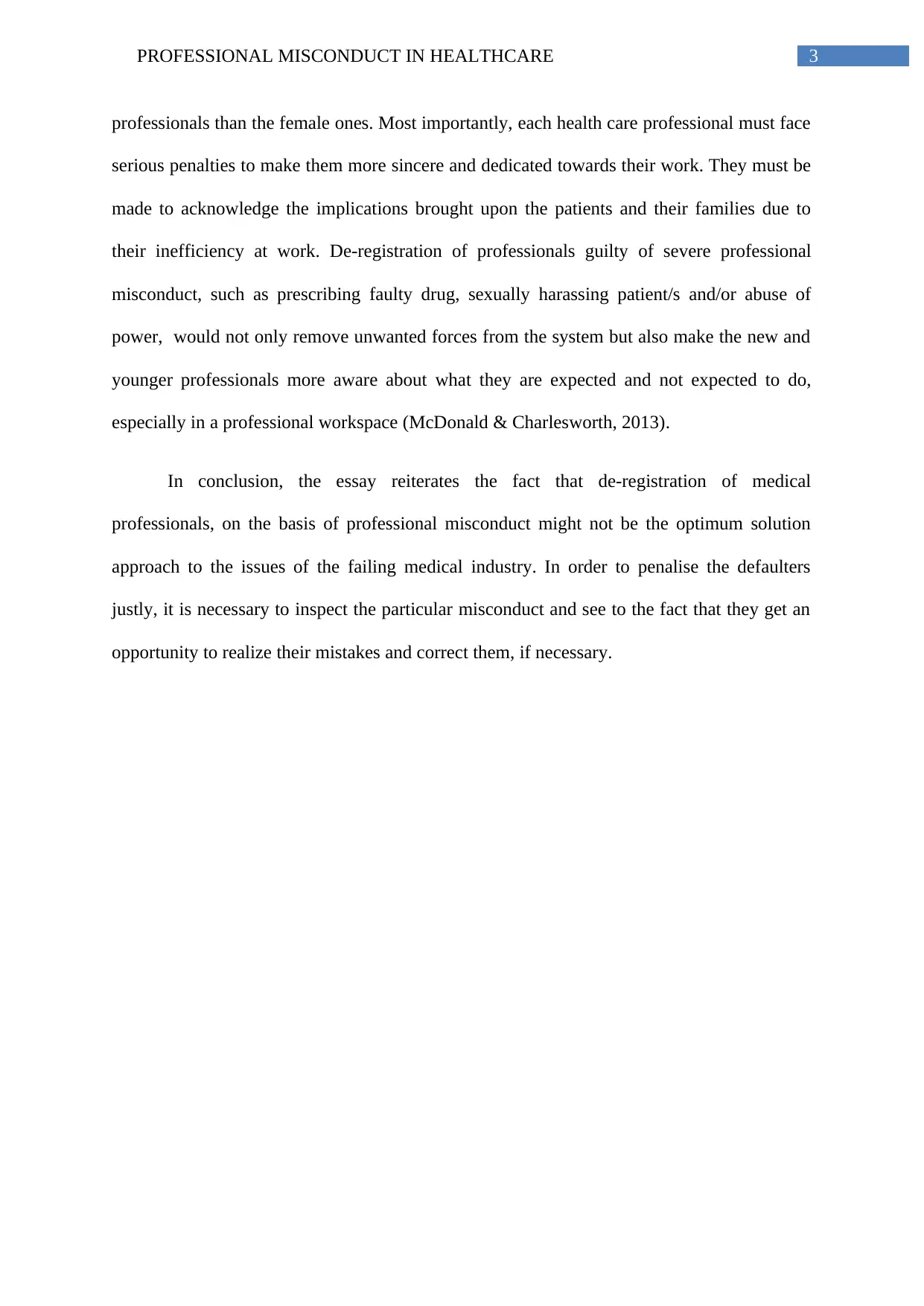
3PROFESSIONAL MISCONDUCT IN HEALTHCARE
professionals than the female ones. Most importantly, each health care professional must face
serious penalties to make them more sincere and dedicated towards their work. They must be
made to acknowledge the implications brought upon the patients and their families due to
their inefficiency at work. De-registration of professionals guilty of severe professional
misconduct, such as prescribing faulty drug, sexually harassing patient/s and/or abuse of
power, would not only remove unwanted forces from the system but also make the new and
younger professionals more aware about what they are expected and not expected to do,
especially in a professional workspace (McDonald & Charlesworth, 2013).
In conclusion, the essay reiterates the fact that de-registration of medical
professionals, on the basis of professional misconduct might not be the optimum solution
approach to the issues of the failing medical industry. In order to penalise the defaulters
justly, it is necessary to inspect the particular misconduct and see to the fact that they get an
opportunity to realize their mistakes and correct them, if necessary.
professionals than the female ones. Most importantly, each health care professional must face
serious penalties to make them more sincere and dedicated towards their work. They must be
made to acknowledge the implications brought upon the patients and their families due to
their inefficiency at work. De-registration of professionals guilty of severe professional
misconduct, such as prescribing faulty drug, sexually harassing patient/s and/or abuse of
power, would not only remove unwanted forces from the system but also make the new and
younger professionals more aware about what they are expected and not expected to do,
especially in a professional workspace (McDonald & Charlesworth, 2013).
In conclusion, the essay reiterates the fact that de-registration of medical
professionals, on the basis of professional misconduct might not be the optimum solution
approach to the issues of the failing medical industry. In order to penalise the defaulters
justly, it is necessary to inspect the particular misconduct and see to the fact that they get an
opportunity to realize their mistakes and correct them, if necessary.
Secure Best Marks with AI Grader
Need help grading? Try our AI Grader for instant feedback on your assignments.
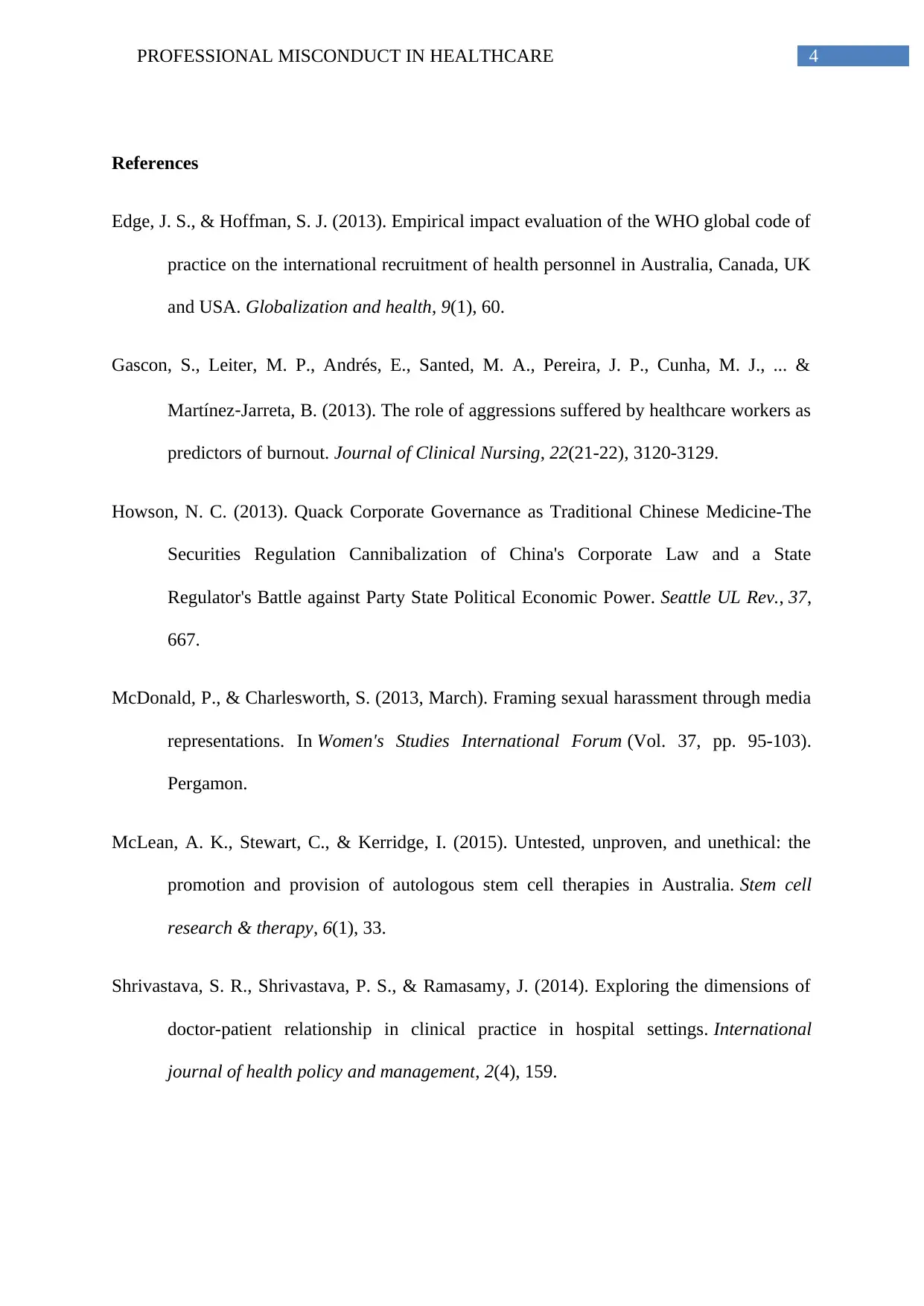
4PROFESSIONAL MISCONDUCT IN HEALTHCARE
References
Edge, J. S., & Hoffman, S. J. (2013). Empirical impact evaluation of the WHO global code of
practice on the international recruitment of health personnel in Australia, Canada, UK
and USA. Globalization and health, 9(1), 60.
Gascon, S., Leiter, M. P., Andrés, E., Santed, M. A., Pereira, J. P., Cunha, M. J., ... &
Martínez‐Jarreta, B. (2013). The role of aggressions suffered by healthcare workers as
predictors of burnout. Journal of Clinical Nursing, 22(21-22), 3120-3129.
Howson, N. C. (2013). Quack Corporate Governance as Traditional Chinese Medicine-The
Securities Regulation Cannibalization of China's Corporate Law and a State
Regulator's Battle against Party State Political Economic Power. Seattle UL Rev., 37,
667.
McDonald, P., & Charlesworth, S. (2013, March). Framing sexual harassment through media
representations. In Women's Studies International Forum (Vol. 37, pp. 95-103).
Pergamon.
McLean, A. K., Stewart, C., & Kerridge, I. (2015). Untested, unproven, and unethical: the
promotion and provision of autologous stem cell therapies in Australia. Stem cell
research & therapy, 6(1), 33.
Shrivastava, S. R., Shrivastava, P. S., & Ramasamy, J. (2014). Exploring the dimensions of
doctor-patient relationship in clinical practice in hospital settings. International
journal of health policy and management, 2(4), 159.
References
Edge, J. S., & Hoffman, S. J. (2013). Empirical impact evaluation of the WHO global code of
practice on the international recruitment of health personnel in Australia, Canada, UK
and USA. Globalization and health, 9(1), 60.
Gascon, S., Leiter, M. P., Andrés, E., Santed, M. A., Pereira, J. P., Cunha, M. J., ... &
Martínez‐Jarreta, B. (2013). The role of aggressions suffered by healthcare workers as
predictors of burnout. Journal of Clinical Nursing, 22(21-22), 3120-3129.
Howson, N. C. (2013). Quack Corporate Governance as Traditional Chinese Medicine-The
Securities Regulation Cannibalization of China's Corporate Law and a State
Regulator's Battle against Party State Political Economic Power. Seattle UL Rev., 37,
667.
McDonald, P., & Charlesworth, S. (2013, March). Framing sexual harassment through media
representations. In Women's Studies International Forum (Vol. 37, pp. 95-103).
Pergamon.
McLean, A. K., Stewart, C., & Kerridge, I. (2015). Untested, unproven, and unethical: the
promotion and provision of autologous stem cell therapies in Australia. Stem cell
research & therapy, 6(1), 33.
Shrivastava, S. R., Shrivastava, P. S., & Ramasamy, J. (2014). Exploring the dimensions of
doctor-patient relationship in clinical practice in hospital settings. International
journal of health policy and management, 2(4), 159.
1 out of 5
Related Documents
Your All-in-One AI-Powered Toolkit for Academic Success.
+13062052269
info@desklib.com
Available 24*7 on WhatsApp / Email
![[object Object]](/_next/static/media/star-bottom.7253800d.svg)
Unlock your academic potential
© 2024 | Zucol Services PVT LTD | All rights reserved.





